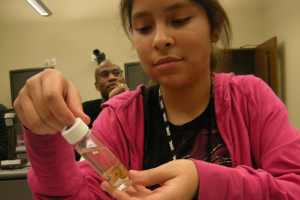Build an aquifer that you can eat, meet Germy the Germ, and have fun learning about environmental and public health with the Hygienic Laboratory's online courses. Our scientists designed these courses to be fun and educational. Tell us if you agree by taking the online survey after finishing a course.
Edible Aquifers
Edible Aquifers is a 17-minute narrated presentation designed for students in third through sixth grades. In this fun, hands-on course, students are introduced to the layers of earth that make up an aquifer and how the composition of these layers can affect the water held in the aquifer.
Lean Processes
Buried in paperwork and office clutter? Consider going '"Lean'" for a more organized, streamlined work environment. The Hygienic Laboratory adopted the Lean Management principles, and has eliminated thousands of cubic feet of unused and recyclable materials since 2007.
iExploreSTEM
iExlporeSTEM festivals are a series of hands-on, science, technology, engineering, and math (STEM) festivals in Iowa. They have the look and feel of a county fair or street festival.
Did You See That ?
In our interactive game, "Did You See That?," public health lab scientists talk about their jobs and the various educational tracks that can lead you to a similar career.
Newborn Screening: Growing up with PKU
Find out why it is so important to detect metabolic and other inherited disorders in the first days of life and see how laboratory scientists perform the screening tests. In Newborn Screening: Growing up with PKU, students in fifth through eighth grades will be introduced to this critical and potentially lifesaving laboratory science.
Germy the Germ
Germy the Germ is a 15-minute narrated presentation for students in kindergarten through third grade. In this colorful course, students will be introduced to many things about germs—from their size to where they are found and how they are spread.
These tools contain general medical and scientific information that was created solely for the purpose of increasing awareness about environmental and public health. They are not intended to serve as medical or scientific advice and should not be used in such a manner. These presentations should not be used as a substitute for professional medical or scientific advice.



